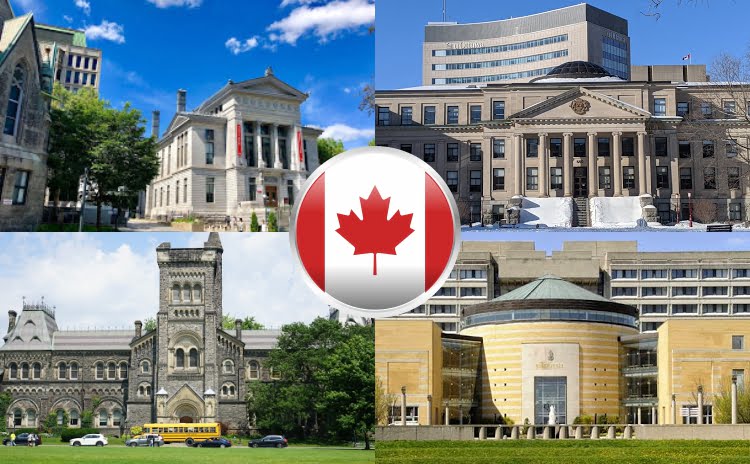Study in Canada
Canadian education is highly recognized for its quality standards worldwide. It has one of the most multicultural environments to Study in Canada, an excellent school and high school system, first-class academic college programs, post-graduate courses and top Canadian universities.

Benefits of Study in Canada
Once you decide to study in Canada you should know that international students can work 20 hours per week while finishing their studies, and 40 hours during break times. After graduating, you can apply for a Post Graduate Work Permit (pgwp) to remain in the country, get Canadian work experience and become a Canadian permanent resident.
Canada is a top destination for international students from all over the world. If you are interested in studying in Canada, you will first need to obtain a Canadian study permit.
1. Obtain your letter of acceptance from a DLI.
2. Prove financial support for you and your family members during the first year of tuition.
3. Prove you will leave Canada at the end of the stay authorized by the study permit.
4. Passport for the applicant and every family member included on the application.
5. Photocopy of marriage certificate, if applicable.
6. Any further documents are required by specific visa offices.
7. Obtain a Certificat d'acceptation du Quebec if the Study is in the Province of Quebec.




Evaluate Your Study in Canada Options
Who is eligible ?
Foreign nationals in the following situations may be eligible to apply for an open work permit:
- Spouses or common-law partners of some temporary foreign workers
- Spouses or common-law partners of some international students
- Some international students who have graduated from a designated program of study in Canada
- Permanent residency applicants who have applied through the inland spousal sponsorship process
- Some young workers participating in programs offered through International Experience Canada (IEC)
- Refugees, refugee claimants, protected persons and their family members
The exact eligibility requirements and application procedure varies depending on which of the above-mentioned situations a foreign national meets.
Pathways for students to get Canadian Permanent Residence (PR)
International students who complete a post-secondary education in Canada have many opportunities to extend their stay, work and get PR status.
After finishing your education in Canada, you can get work experience by obtaining a Post-Graduation Work Permit (PGWP) which will enable you to work in Canada for up to three years. Your education in Canada improves your score when applying for permanent residence.
While holding your Post Graduation Work Permit, you can then go apply to federal and provincial permanent residence programs, such as:
Express Entry
Express Entry is an electronic system used by IRCC to manage PR and citizenship applications. Applicants are ranked based on their age, language skills, work experience, among other factors.
Former international students may apply to Express Entry under the Canadian Experience Class (CEC) program, allowing international students to get PR after one year of Canadian work experience.
Provincial Nominee Program (PNP)
The PNP program allows workers in selected provinces to hire foreigners that meet their local economic needs. Under the Provincial Nominee Program, applicants will also have a higher score for their Canadian Permanent Resident status.
Quebec Immigration Program
This Province operates its own immigration system with different programs from others offered by the Federal Government. Quebec is a top-rated destination for international students that helps international students to become Canadian permanent residents.
Other Federal Programs
The Federal Government offers different programs to support international students to get PR status. Some of those programs are: the Atlantic International Graduate Program (which operates under the Atlantic Immigration Program) and the Rural and Northern Immigration Pilot.
About Canada’s Universities and Colleges
There are hundreds of universities, colleges, and other educational institutions authorized by IRCC (Immigration, Refugees and Citizenship Canada) to welcome international students. These institutions are called designated learning institutions (DLIs)
Given the large number of DLIs across Canada, you are very likely to find the perfect Some of the most internationally-renowned universities are:
- McGill University
- McMaster University
- University of Alberta
- University of British Columbia
- University of Calgary
- University of Montreal
- University of Ottawa
- University of Toronto
- University of Waterloo
Canada also has over 150 colleges that offer high quality education for international students. College programs are more practical. They focus on helping students to find work in their field.
If you need help finding the right program for you at a Canadian designated learning institution, please complete our Assessment Form to assist you as soon as possible.
Other benefits of studying in Canada
Every year Canada welcomes thousands of international students and encourages them to start their immigration journey. Due to the COVID- 19 pandemic, international students are able to study online from abroad and have the same benefits of being in Canada and obtaining a Post-Graduation Work Permit.
The PGWP allows international students to get Canadian work experience and enhance the chances of obtaining Canadian permanent residence. The Post Graduation Work Permit varies from 1 to 3 years.
Some benefits of starting your Canadian immigration journey are:
- Even with the pandemic, you can still start your Canadian program in your country and obtain a PGWP.
- Canadian colleges and universities are offering some programs 100% online.
- Studying your program online can make your studies more affordable. Keep in mind that Canada is already more affordable to study in than the United States, United Kingdom, and Australia.
- Under the study permit you can work for up to 20 hours per week during your classes, and full-time during regular breaks such as winter and summer.
- Your spouse or common-law partner will get an open work permit and your children will attend public school for free.
- Your Canadian degree will help you integrate into the Canadian market and get more points under several immigration programs.
- You will improve your language skills and discover different cultures.
If a study permit application gets refused, can an applicant appeal or reapply?
The applicant may re-apply with a new application.
What happens if an application does not include all the documents required upon submission?
An application needs to be fully complete on submission. If a document is missing, the decision may be made based on what has already been submitted, without giving you chance to submit the missing documents.
As a Student am I able to work while studying?
As long as you have a valid study permit and it indicates that you may work while studying you have the options of working on campus, working off-campus, applying for a co-op or intern program, or helping your spouse/partner to work.
Can I study in Canada without a Study Permit?
If you are enrolling in a program that is less than 6 months long you do not need a Study Permit however you will need to secure a temporary resident visa (TRV) or electronic travel Visa (eTA).
If the program is longer than 6 months the student will need to apply for a study permit.
There is an advantage to applying for a Study Permit even if your program that you are applying for is less than 6 months.
What if you end up deciding to enroll in another study program or enroll in full-time studies at a University or College?
It would be easier for you to stay in the country rather than leave and re-apply for the Study Permit via a Canadian visa office outside Canada.
Frequently Asked Questions
What is a Post Graduation Work Permit (PGWP) ?
The PGWP is an open work permit that allows students who completed post graduated courses in Canada to work for any employer without a previous job offer.
Pathways and eligibility criteria may change depending on each province’s needs and requirements.
What are the advantages of studying in Canada?
You can study at one of the Top Canadian Universities, have work experience while studying and bringing your family members with you.
When must I apply for the study permit ?
You must apply as soon as you receive your letter of acceptance.
Is it possible to change institutions or programs?
Yes, you can do it. However, you must let the IRCC know about your changes.
How long can I stay in Canada after graduating?
If you applied for the PGWP you can stay and have work experience as long as your permit is valid.
Why should I study in Canada?
Reasons why international students choose Canada include:
- High quality of education
- International students have the opportunity to work during and after their studies.
- You can improve your English and French skills.
- Multicultural society.
- Canada is affordable compared with other popular international student destinations.
How many international students are in Canada?
There were over 640,000 international students at the end of 2019 and the number keeps increasing each year. Canada is a very popular country to study, work and immigrate.
Which countries are Canada’s international students coming from?
Canada welcomes international students from nearly 200 different countries each year.
Popular source countries of Canada’s international students include India, China, South Korea, France, China, Vietnam, The U.S., Iran, Nigeria, and Mexico.
Can I bring my family to Canada?
Yes. You may bring your spouse, common law partner, and dependent children.
Which is the best city for international students?
All Canadian cities offer similar benefits for international students. Such as high quality education, multicultural environment and security.
To decide you can consider:
- Program and field of studies.
- Job opportunities in your selected city.
- Whether you prefer to be in an English and/or French speaking city.
- Cultural activities.
- Your budget
Can I stay in Canada after my studies?
You may be eligible for a Post-Graduation Work Permit (PGWP) to stay and get work experience. There are also other pathways to allow you to stay in Canada temporarily and apply for Permanent Residency.
Can I become a permanent resident after my studies in Canada?
There are several programs that can lead to permanent residence, including the three programs managed under Express Entry (Canadian Experience Class, the Federal Skilled Worker Program, and the Federal Skilled Trades Program).
Other options available are the Provincial Nominee Program, Quebec Investor and the Atlantic Immigration Program.
What is a Post-Graduation Work Permit (PGWP)?
The PGWP is an open work permit issued to foreign students who have graduated from a designated learning institution.
It allows you to get work experience in Canada and become eligible for different immigration programs. Which can require candidates with a previous Canadian work experience
The PGWP is valid for a period equivalent to the program of study you finished in Canada. With a length between 8 months and maximum of 3 years.
How do I qualify for a Post-Graduation Work Permit (PGWP)?
To apply you must have completed a full-time program at an eligible designated learning institution in Canada for at least 8 months.
Can international students work while studying in Canada?
Yes, you may be able to work on campus or off campus as long as you meet the conditions provided in your study permit. You can only work in Canada after starting your program.
You may be allowed to work on your school’s campus if you:
- Are a full-time student and
- Have a Social Insurance Number (SIN)
In case you need to work for a co-op, you must get a work permit to allow you to do it. You may be eligible if:
- Work is required in your program.
- You hold a valid study permit.
- Your institution gives you the letter confirming that all students must work to get their degree.
- The co-op or internship is 50% or less of your program.
If you are taking English or French language classes, general interest courses or courses to prepare for another program, you may not be eligible for a co-op work permit.
If you want to work off-campus, your study permit must say that you can work off campus. You must also:
- be a full-time student,
- be enrolled in a post-secondary program,
- be enrolled in a study program that is at least 6 months long, and leads to a degree, diploma or certificate,
- have started studying,
- have a Social Insurance Number (SIN)
If you are a part-time student, you may only work off campus:
- if you have met all the criteria listed above, and,
- you’re only study part-time because:
- you’re in your last semester and you don’t need to study full-time to complete your program
- you were a full-time student in Canada up until your last semester
How many hours can I work while on a study permit ?
Your study permit gives you the conditions to work in Canada. You are allowed to work off campus for 20 hours per week during the school year. You can also work full-time during scheduled breaks.
There are no restrictions to the number of hours you can work on campus.
Can I get a scholarship in Canada?
Yes. You may apply for a scholarship through your institution or third-parties.
How much money do I need to study in Canada?
Tuition and expenses vary in each province or territory. Studying in a bigger city in Canada will cost more than if you chose a program in a smaller city.
Education Canada is considered more affordable compared to Australia, the U.S., some European countries and the U.K. Some institutions offer programs under $15,000 CAD per year.
Besides your tuition fee, you need to demonstrate you can support yourself and your family members in Canada for your first year living in Canada.
Illustration table for all territories excepted Quebec:
| Amount of funds required per year (excluding tuition fees) | |
|---|---|
| You | CAD $10,000 |
| First family member | CAD $4,000 |
| Any additional family members | CAD $3,000 |
If you plan on studying in Quebec, the following table illustrates the minimum funds that you need to have access to in order to support yourself financially while studying in the province:
| Amount of funds required per year (excluding tuition fees) | |
|---|---|
| You | CAD $11,000 |
| First family member (18 or older) | CAD $5,100 |
| irst family member (under 18) | CAD $3,800 |
| Any additional family member (18 or older) | CAD $5,125 |
| Any additional family member (under 18) | CAD $1,903 |
How do I become eligible for the Student Direct Stream (SDS)?
To be eligible for the SDS, you must:
- Be a legal resident of China, India, Morocco, Pakistan, the Philippines, Senegal, or Vietnam
- Have completed a valid language test in the last 2 years, with an IELTS score of 6.0 or higher, or a TEF score equivalent to the Canadian Language Benchmark (CLB) of 7 or higher.
- Have a Guaranteed Investment Certificate (GIC) of at least $10,000 insured by the Canadian Deposit Insurance Corporation (CDIC). The GIC must meet specific criteria.
- Prove full payment of your tuition fees for your first year of study.
- Provide a letter of acceptance from the institution.
- Provide your most recent secondary or post-secondary transcripts.
- Get a medical exam before you apply if you are required to get one (You may be required to complete this step if you have lived or traveled to one of the designated countries before coming to Canada, or if your field of study requires it.
- Get a police certificate before you apply if it is required in your case (your visa office instructions will tell you if you need to get a police certificate).
What is the Student Direct Stream (SDS)?
The Student Direct Stream (SDS) is a program that expedites study permits faster than regular processing times. To apply, you must live in one of the following countries:
- Antigua y Barbuda
- Brazil
- Colombia
- Costa Rica
- China
- Pakistan
- Peru
- Philippines
- India
- Morocco
- Saint Vincent and the Grenadines
- Senegal
- Trinidad and Tobago
- Vietnam
How do I become eligible for the Student Direct Stream (SDS)?
- Be a legal resident of Antigua and Barbuda, Brazil, China, Colombia, Costa Rica, India, Morocco, Pakistan, Peru, Philippines, Senegal, Saint Vincent and the Grenadines, Trinidad and Tobago or Vietnam.
- Have completed a valid language with an IELTS score of 6.0 or higher, or a TEF score of 7 or higher.
- Prove you have a Guaranteed Investment Certificate (GIC) of at least $10,000 CAD insured by the Canadian Deposit Insurance Corporation (CDIC). The GIC must meet specific criteria.
- Full payment of your tuition fee for the first year.
- Letter of acceptance from the institution.
- Show your most recent secondary or post-secondary transcripts.
- If required, get your medical exam (some countries are exempt)
- Get your police certificate
What is the age limit to study in Canada?
No, there is no age limit
Do I need to take a language test to study in Canada?
The institution may require you to take a language test to be admitted, but you don’t need it to apply for your study permit.
What are my responsibilities as an international student in Canada?
The Canadian government requires international students to:
- Remain enrolled at their DLI (Designated Learning Institution)
- Follow all the conditions listed on your study permit
- If you don’t meet your study permit requirements, you should stop studying.
- You must leave Canada as soon as your study permit expires. Unless you have obtained another temporary permit or PR status.
How long does it take to get a study permit?
Processing times depend on the visa officers and your country of residence.
What are the differences in study levels, and between colleges, universities, and other designated learning institutions in Canada?
- Universities: You can study undergraduate, postgraduate, certificates and diplomas.
- Community colleges: Offers certificates programs, diplomas, associate degrees, undergraduate and postgraduate.
- Career and technical colleges: They focus on offering technical training to help adults improve their careers.
| Credential | Average Length | Overview |
|---|---|---|
| Certificates and Diplomas | 1-2 years | Career oriented programs to help adults find work related to credential. |
| Associate degrees | 2 years | Similar to first two levels of study of a 4-year Bachelor’s degree. |
| Bachelor\’s degrees | 3-4 years | Usually 4 years in length except can be as short as 3 years in provinces such as Quebec. Offered at universities and tend to be more theoretical in nature than college programs. |
| Postgraduate diplomas | 1-2 years | A specialized qualification after completing a Bachelor’s degree. |
| Master\’s degrees | 1-2 years | Can either include a research thesis or no thesis submission. |
| PhD’s | 4-8 years | Usually involves a combination of course work at the beginning of the PhD, followed by the completion of a dissertation that is successfully defended before an academic panel. |
| Post-Doctoral Programs | No time limit | Specialized research program after completing a PhD. |
What is the application deadline for DLIs in Canada?
Each institution has its own deadlines that vary depending on the program or faculty you are applying to. Usually institutions have all their information on their official websites and social media.
What is the Nigeria Student Express Program?
It is a program created by IRCC to reduce the processing time of study permits for Nigerian residents.
If you want to apply, you must meet the following requirements:
- Be a Nigerian citizen or legally reside in Nigeria.
- Have the acceptance letter from your Canadian institution.
- Reside outside of Canada when you apply.
- Show enough funds with a MyBank certificate equivalent to CAD $30,000 for at least six months PLUS one year of banking history.
- Get your medical exam.
- Have a language test with a score of 6.0 or higher on IELTS of 7.0 in each skill for TEF.
- If you want to study in Quebec, have a certificat d\’acceptation du Québec (CAQ) from the Quebec government
How many international students gain Canadian permanent residence (PR) each year?
Coming as an international student is one of the most common pathways of becoming a Permanent Resident of Canada. Many immigration programs grant points to international students to support them on their PR application. According to IRCC and federal government statistics more than 50.000 international students become Permanent Residents each year.
How can I convince my parents to study in Canada?
It vary depending on their concerns , but in general you can support your project to study in Canada by telling them that:
Quality: Canada offers some of the highest education worldwide. Somo institutions are ranked among the top 100 globally each year.
Security: Canada is a very safe country and welcomes people from all over the world every year.
Grow opportunities: International students have big opportunities of finding excellent jobs and enrich their professional careers.
Affordable education: Institutions in Canada are more affordable than the United States, UK or Australia.
Canadian PR : IRCC supports international students to get Permanent Resident status and live in Canada permanently.
Multicultural environment: Canada is one of the most popular countries for immigration. You will find people from all over the world, with different languages and cultures.





